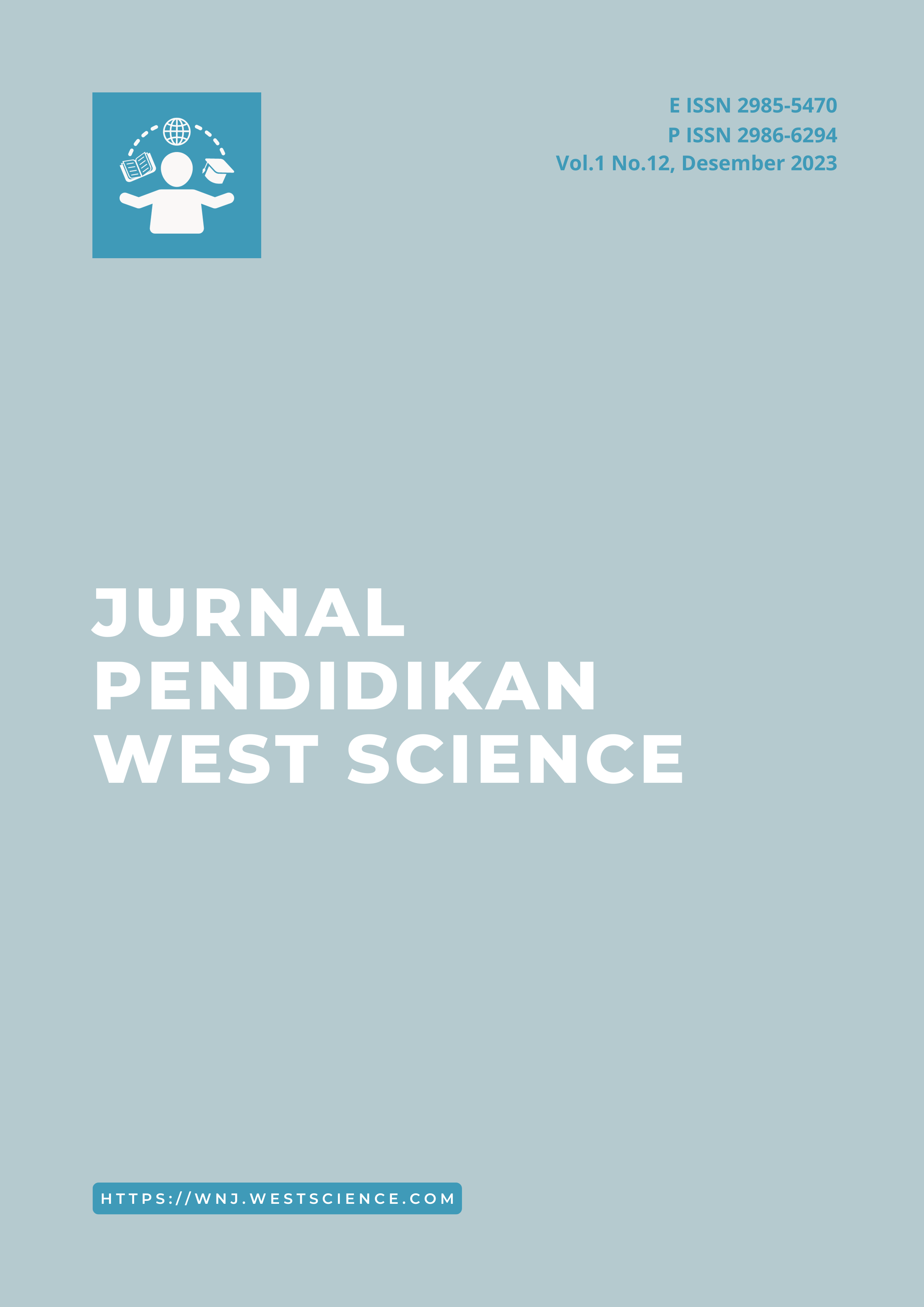Pengaruh Kecerdasan Buatan dan Teknologi Pendidikan terhadap Peningkatan Efektivitas Proses Pembelajaran Mahasiswa di Jawa Timur
DOI:
https://doi.org/10.58812/jpdws.v1i12.863Kata Kunci:
Kecerdasan Buatan, Teknologi Pendidikan, Efektivitas, Pembelajaran Mahasiswa, Jawa TimurAbstrak
Penelitian ini menyelidiki dampak kecerdasan buatan (AI) dan teknologi pendidikan terhadap efektivitas proses pembelajaran siswa di Jawa Timur. Analisis kuantitatif dilakukan dengan melibatkan 150 peserta dari berbagai tingkat pendidikan. Statistik deskriptif, analisis korelasi, dan pemodelan regresi digunakan untuk mengeksplorasi hubungan antara frekuensi penggunaan AI dan teknologi pendidikan, efektivitas yang dirasakan, dan faktor demografis. Hasilnya menunjukkan adanya korelasi positif yang kuat antara frekuensi penggunaan teknologi dan efektivitas yang dirasakan. Analisis regresi mengidentifikasi frekuensi penggunaan AI dan teknologi pendidikan sebagai prediktor yang signifikan terhadap peningkatan hasil belajar siswa. Studi ini menyoroti manfaat potensial dari peningkatan integrasi teknologi dan merekomendasikan perencanaan strategis untuk implementasi yang efektif. Penelitian kualitatif lebih lanjut direkomendasikan untuk mengatasi tantangan dan memastikan akses yang adil.
Referensi
Ahmadi, F., Syahputra, H., Hardyanto, W., Kristanto, A., Pramono, S. E., Parinsi, M. T., Sugiarta, I., & Sugihartono, I. (2023). Developing Mobile Learning Application Containing Basic Pedagogy Material as the Supplement in Improving College Students’ Learning Outcome in Teacher Training Institutes of Indonesia. European Journal of Educational Research, 12(1).
Ahmed, M. I. B., Alotaibi, R. B., Al-Qahtani, R. A., Al-Qahtani, R. S., Al-Hetela, S. S., Al-Matar, K. A., Al-Saqer, N. K., Rahman, A., Saraireh, L., & Youldash, M. (2023). Deep Learning Approach to Recyclable Products Classification: Towards Sustainable Waste Management. Sustainability, 15(14), 11138.
Apriyansyah, B., Hanoum, S., Prihananto, P., & Mukaromah, S. L. (2020). Efficiency evaluation of primary and secondary education sector performance in East Java using data envelopment analysis. JURNAL SOSIAL HUMANIORA (JSH), 13(2), 151–163.
Bećirović, S. (2023). The Use of Open Educational Resources (OER) in Digital Pedagogy. In Digital Pedagogy: The Use of Digital Technologies in Contemporary Education (pp. 69–81). Springer.
Chen, C. (2023). Research on Online Teaching Emotion Detection based on Federated Learning. Proceedings of the 2023 3rd International Conference on Bioinformatics and Intelligent Computing, 159–164.
Conati, C., & Lallé, S. (2023). 8. Student modeling in open-ended learning environments. Handbook of Artificial Intelligence in Education, 170–183.
de Souza Zanirato Maia, J., Bueno, A. P. A., & Sato, J. R. (2023). Applications of Artificial Intelligence Models in Educational Analytics and Decision Making: A Systematic Review. World, 4(2), 288–313.
Elbourhamy, D. M., Najmi, A. H., & Elfeky, A. I. M. (2023). Students’ performance in interactive environments: an intelligent model. PeerJ Computer Science, 9, e1348.
Firat, M. (2023). Towards a Unified Open Education Ecosystem through Generative AI, Blockchain, DAO, MMLA and NFT.
Frehlich, C. (2020). Immersive learning: A practical guide to virtual reality’s superpowers in education. Rowman & Littlefield Publishers.
Hutson, J., & Ceballos, J. (2023). Rethinking education in the age of AI: the importance of developing durable skills in the Industry 4.0. Journal of Information Economics, 1(2).
Ifenthaler, D., & Schumacher, C. (2023). Reciprocal issues of artificial and human intelligence in education. In Journal of Research on Technology in Education (Vol. 55, Issue 1, pp. 1–6). Taylor & Francis.
Jha, M., Jha, S., Thakur, S., & Xu, J. (2022). Student Engagement and Leaning through Digital Educational Technology. 2022 IEEE Asia-Pacific Conference on Computer Science and Data Engineering (CSDE), 1–6.
Khaerani, N. S., Lintangsari, A. P., & Gayatri, P. (2023). EFL Students’ Learning Engagement in The Post Pandemic Era. JEELS (Journal of English Education and Linguistics Studies), 10(1), 119–148.
Kumar, D., Haque, A., Mishra, K., Islam, F., Mishra, B. K., & Ahmad, S. (2023). Exploring the transformative role of artificial intelligence and metaverse in education: A comprehensive review. Metaverse Basic and Applied Research, 2, 55.
Liu, Y., & Baucham, M. (2023). AI Technology: Key to Successful Assessment. In Handbook of Research on Redesigning Teaching, Learning, and Assessment in the Digital Era (pp. 304–325). IGI Global.
Mena-Guacas, A. F., Rodríguez, J. A. U., Trujillo, D. M. S., Gómez-Galán, J., & López-Meneses, E. (2023). Collaborative learning and skill development for educational growth of artificial intelligence: A systematic review. Contemporary Educational Technology, 15(3), ep428.
Nasiba, M. (2023). Innovating Higher Education by Using Education Technology and Expert Systems: Pathways to Educational Innovation. International Journal of Social Science Research and Review, 6(6), 112–120.
Ristanto, A. D., Ananda, C. F., & Pangestuty, F. W. (2022). Effect of Socio-Economic Characteristics and Cultural Areas on the Educated Poor in East Java Province. Journal of International Conference Proceedings, 5(4), 150–159.
Ritter, S., & Koedinger, K. R. (2023). Large-scale commercialization of AI in school-based environments. In Handbook of Artificial Intelligence in Education (pp. 524–536). Edward Elgar Publishing.
Salas-Pilco, S. Z., Xiao, K., & Hu, X. (2022). Artificial intelligence and learning analytics in teacher education: A systematic review. Education Sciences, 12(8), 569.
Setiawan, A., & Efendi, E. Y. (2023). Implementation of Information Communication Technology (ICT) as a Teaching Aid for Children with Special Needs.
Soesanto, R. H., Dirgantoro, K. P. S., & Priyantim, N. (2022). Indonesian Students’ Perceptions towards AI-Based Learning in Mathematics. Journal on Mathematics Education, 13(3), 531–548.
Theophilou, E., Koyutürk, C., Yavari, M., Bursic, S., Donabauer, G., Telari, A., Testa, A., Boiano, R., Hernandez-Leo, D., & Ruskov, M. (2023). Learning to Prompt in the Classroom to Understand AI Limits: A pilot study. International Conference of the Italian Association for Artificial Intelligence, 481–496.
Weitz, K., Schlagowski, R., & André, E. (2021). Demystifying artificial intelligence for end-users: findings from a participatory machine learning show. German Conference on Artificial Intelligence (Künstliche Intelligenz), 257–270.
Zhang, K., & Aslan, A. B. (2021). AI technologies for education: Recent research & future directions. Computers and Education: Artificial Intelligence, 2, 100025.
Unduhan
Diterbitkan
Cara Mengutip
Terbitan
Bagian
Lisensi
Hak Cipta (c) 2023 Nanny Mayasari, Rizki Dewantara, Yocki Yuanti

Artikel ini berlisensiCreative Commons Attribution-ShareAlike 4.0 International License.



















 Instagram
Instagram 